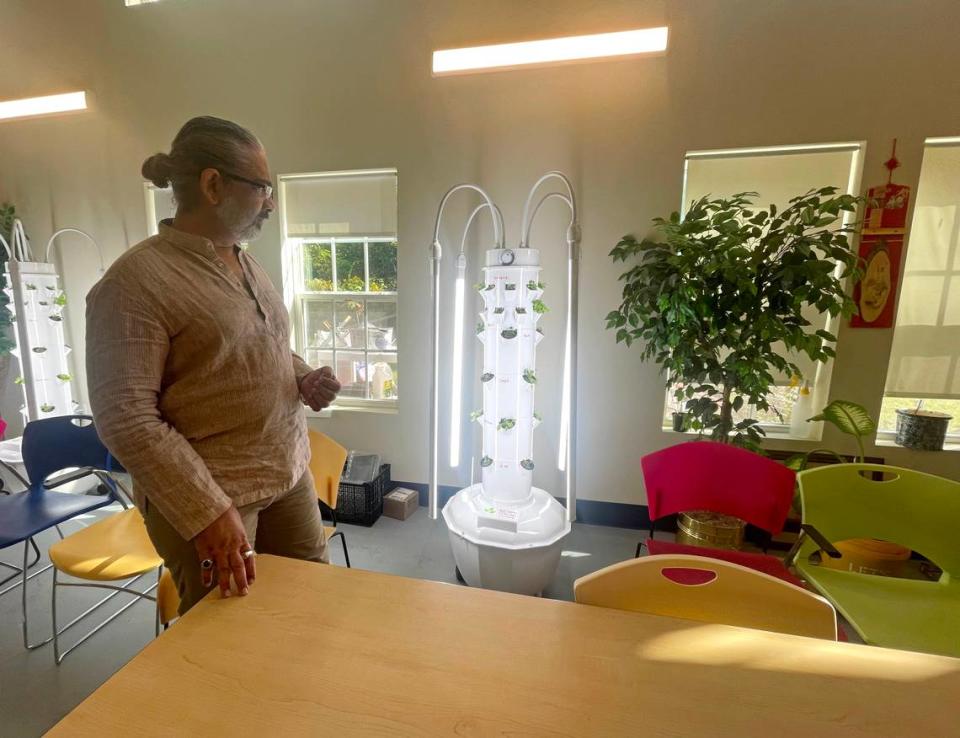Food. Fellowship. Culture. How Charlotte’s Hindu Center supports refugees, seniors
The path to the Hindu Center of Charlotte takes visitors through a neighborhood of red brick ranch houses built in the 1960s, off Idlewild Road in east Charlotte. Weekdays, at the nearby senior center, volunteers prepare more than 140 meals for refugees who have trouble adjusting to an American diet, which may include fatty meats, refined carbohydrates or processed foods.
Standing at the back of the center, Nimish Bhatt greets two college journalists. “My daughters! Welcome!” he says.
Bhatt leads a team of volunteers who provide food and fellowship to help refugees and seniors adjust to life in the United States. Called the Universal Institute for Successful Aging of Carolinas, the nonprofit provides temporary housing; navigational services for refugees; educational programs for youth, seniors and women. COVID lockdowns in March 2020 accelerated the center’s need for food distribution, and the program has continued at this level since then.
Meals for Refugees
On a recent Monday In October, volunteers prepared a lunch of roti, dal, basmati rice, aloo matar, mango semolina, and an apple. For people who lack access to an Indian restaurant, these dishes are flatbread, lentil stew, potato and pea curry, and mango puree.
Bhatt explained every meal contains protein, vegetables, fruit, two grains and something sweet.
“Our goal is to keep these for nutrition and other mental health needs of the seniors when they are alone at home,” he said. “Loneliness is the main issue for seniors being suicidal, anxiety and depression.”
Volunteers encourage seniors to sit near the kitchen while meals are prepared. The spices remind them of home, elevate appetites, which helps with depression.

The menu is not always Indian, often veering into Italian, African, Asian, and Latin American dishes. The vegetarian diet of most people supported by the center is rooted in fresh ingredients, homegrown vegetables and ancient grains. As many as eight volunteers, who work during the day, come during lunchtime to drive the meals to people’s homes and check on how seniors are doing.
Brakash Veerabhadrappa volunteers as a cook because he wants to help seniors who miss the food and the culture of their homes in far-away countries. He likes to cook, and the highest compliment for him is when people say the meal reminds them of home.
“It should feel like it’s their home food, not restaurant food,” Veerabhadrappa said.
In a small kitchen inside the institute, Bakulamaski Patel, a resident, made gugara, a holiday sweet, for refugees living there. She speaks no English, but offers Diwali treats to visitors with a smile.
Funding for meals comes from county and federal agencies, and nonprofit organizations but government aid is set to end next year. Bhatt is concerned and focused on how to continue services.
The refugee meal service is smaller and more specific than other nonprofits, such as Friendship Trays, which started in Charlotte in 1976 and merged with Loaves and Fishes in March 2021. Friendship Trays distributes meals to about 700 people of all ages, and also provides meals for doctor-prescribed diets.

Meals from different cultures
The center is preparing for a meal between Thanksgiving and Christmas to celebrate the gift of humanity and to bring different cultures together. Bhatt and his wife, Rashmi Bhatt, are preparing vegetarian dishes from multiple nationalities, including American tomato soup, tacos and beans, and juices from fresh sugar cane and mango.
During the celebration, volunteer physicians, nurses and pharmacists will manage “quiet clinics” to perform blood tests and administer flu and booster shots. Providers of entertainment and transportation also support the event. The key objective for the refugees, Bhatt said, is “a reminder that someone cares for them.”
Indoor and outdoor gardens
Gardens at the center also provide seniors with a purpose and help deal with depression, Bhatt said. The center has two indoor gardens consisting of 5-foot-tall plastic columns with pockets for basil, arugula, bibb lettuce, green onions and other herbs and greens. The columns enable seniors in wheelchairs to take care of the plants.
Outside the house, Bhatt provided a tour of a small garden filled with tomatoes, onions and peppers, grown for the daily meal distribution. Both gardens bring people together and teach them about growth and humanity, Bhatt said.

For people who experienced trauma, reminders of light
Nimish knows firsthand the struggles faced by people uprooted from home and dropped into another culture. The volunteer staff frequently deals with refugees from Southeast Asia and Africa, many of whom have never seen a western stove, upright toilet or shower.
Bhatt explained that the center serves as a reminder of goodness, humanity and light for people who have experienced high levels of trauma.
The center recognizes the importance of honoring the culture of the people it serves. The center’s volunteer staff prepared a meal honoring the Hindu festival of Diwali, a week before it’s celebrated. As many as 32,000 residents in Mecklenburg County hail from India, according to 2019 U.S. census data. Bhatt explained that before businesses began capitalizing on Diwali, it was a simple fall celebration of changing weather and harvest time, with new grains coming to market.
“It is more of the festivity of light over evilness,” Bhatt said. “The evilness is within everybody, like greed, lust and anger. All that we want to forget and to be in harmony with each other, sharing our best abilities we can.”
Simone Feast of Raleigh and Palmer Magri of Charlotte are students in the James L. Knight School of Communication at Queens University of Charlotte, which provides the news service in support of local community news.

 Yahoo Movies
Yahoo Movies 
